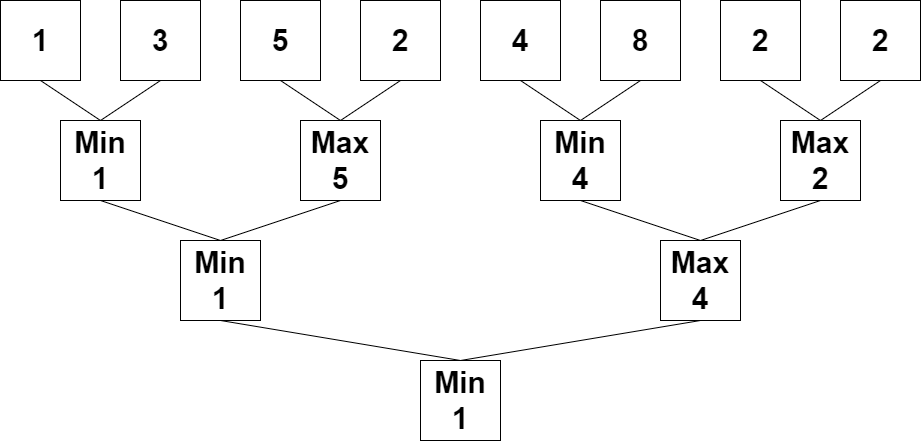| comments | difficulty | edit_url | rating | source | tags | ||
|---|---|---|---|---|---|---|---|
true |
Easy |
1241 |
Weekly Contest 296 Q1 |
|
You are given a 0-indexed integer array nums whose length is a power of 2.
Apply the following algorithm on nums:
- Let
nbe the length ofnums. Ifn == 1, end the process. Otherwise, create a new 0-indexed integer arraynewNumsof lengthn / 2. - For every even index
iwhere0 <= i < n / 2, assign the value ofnewNums[i]asmin(nums[2 * i], nums[2 * i + 1]). - For every odd index
iwhere0 <= i < n / 2, assign the value ofnewNums[i]asmax(nums[2 * i], nums[2 * i + 1]). - Replace the array
numswithnewNums. - Repeat the entire process starting from step 1.
Return the last number that remains in nums after applying the algorithm.
Example 1:
Input: nums = [1,3,5,2,4,8,2,2] Output: 1 Explanation: The following arrays are the results of applying the algorithm repeatedly. First: nums = [1,5,4,2] Second: nums = [1,4] Third: nums = [1] 1 is the last remaining number, so we return 1.
Example 2:
Input: nums = [3] Output: 3 Explanation: 3 is already the last remaining number, so we return 3.
Constraints:
1 <= nums.length <= 10241 <= nums[i] <= 109nums.lengthis a power of2.
class Solution:
def minMaxGame(self, nums: List[int]) -> int:
n = len(nums)
while n > 1:
n >>= 1
for i in range(n):
a, b = nums[i << 1], nums[i << 1 | 1]
nums[i] = min(a, b) if i % 2 == 0 else max(a, b)
return nums[0]class Solution {
public int minMaxGame(int[] nums) {
for (int n = nums.length; n > 1;) {
n >>= 1;
for (int i = 0; i < n; ++i) {
int a = nums[i << 1], b = nums[i << 1 | 1];
nums[i] = i % 2 == 0 ? Math.min(a, b) : Math.max(a, b);
}
}
return nums[0];
}
}class Solution {
public:
int minMaxGame(vector<int>& nums) {
for (int n = nums.size(); n > 1;) {
n >>= 1;
for (int i = 0; i < n; ++i) {
int a = nums[i << 1], b = nums[i << 1 | 1];
nums[i] = i % 2 == 0 ? min(a, b) : max(a, b);
}
}
return nums[0];
}
};func minMaxGame(nums []int) int {
for n := len(nums); n > 1; {
n >>= 1
for i := 0; i < n; i++ {
a, b := nums[i<<1], nums[i<<1|1]
if i%2 == 0 {
nums[i] = min(a, b)
} else {
nums[i] = max(a, b)
}
}
}
return nums[0]
}function minMaxGame(nums: number[]): number {
for (let n = nums.length; n > 1; ) {
n >>= 1;
for (let i = 0; i < n; ++i) {
const a = nums[i << 1];
const b = nums[(i << 1) | 1];
nums[i] = i % 2 == 0 ? Math.min(a, b) : Math.max(a, b);
}
}
return nums[0];
}impl Solution {
pub fn min_max_game(mut nums: Vec<i32>) -> i32 {
let mut n = nums.len();
while n != 1 {
n >>= 1;
for i in 0..n {
nums[i] = (if (i & 1) == 1 { i32::max } else { i32::min })(
nums[i << 1],
nums[(i << 1) | 1],
);
}
}
nums[0]
}
}#define min(a, b) (((a) < (b)) ? (a) : (b))
#define max(a, b) (((a) > (b)) ? (a) : (b))
int minMaxGame(int* nums, int numsSize) {
while (numsSize != 1) {
numsSize >>= 1;
for (int i = 0; i < numsSize; i++) {
int a = nums[i << 1];
int b = nums[i << 1 | 1];
nums[i] = i & 1 ? max(a, b) : min(a, b);
}
}
return nums[0];
}